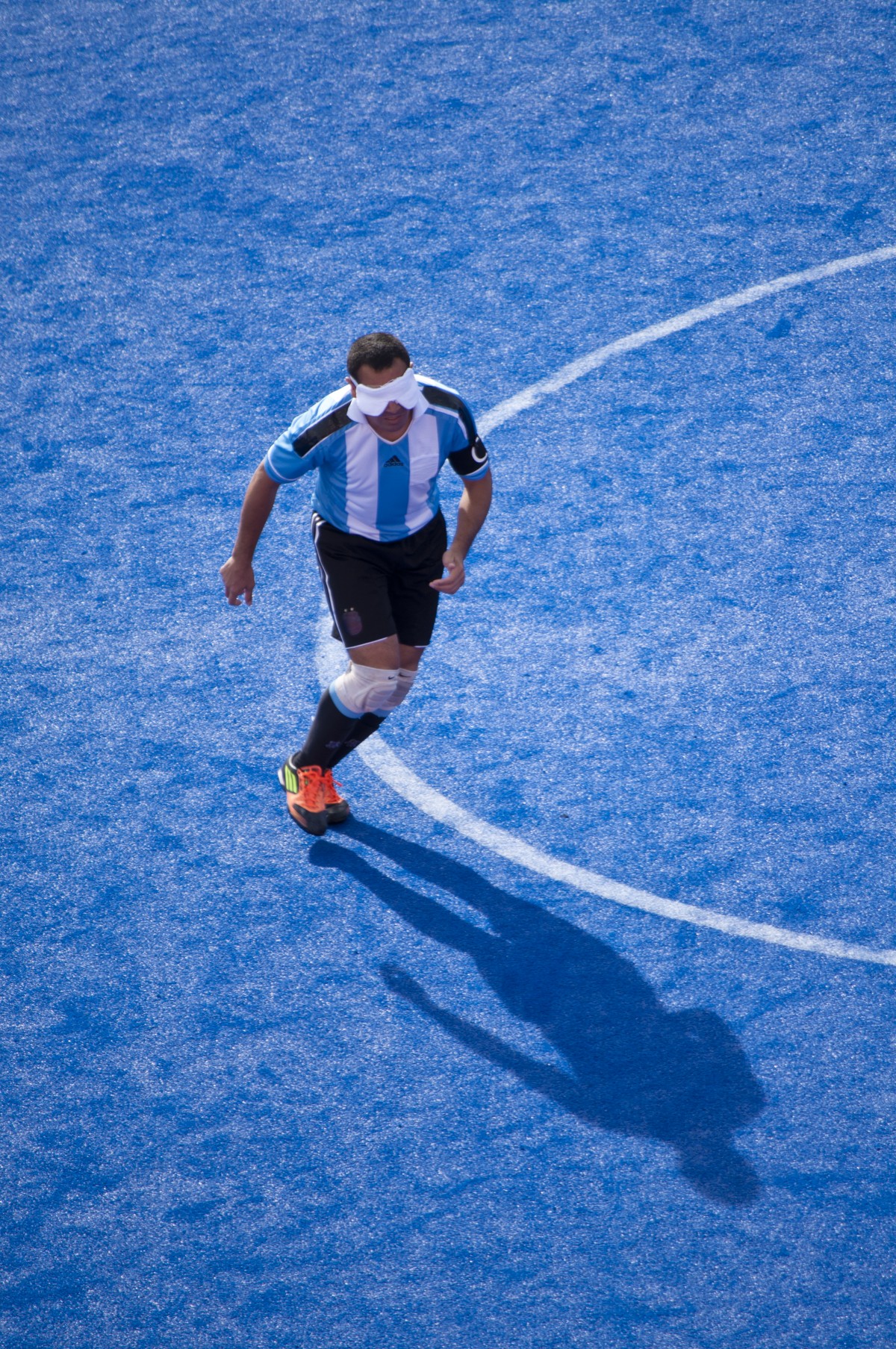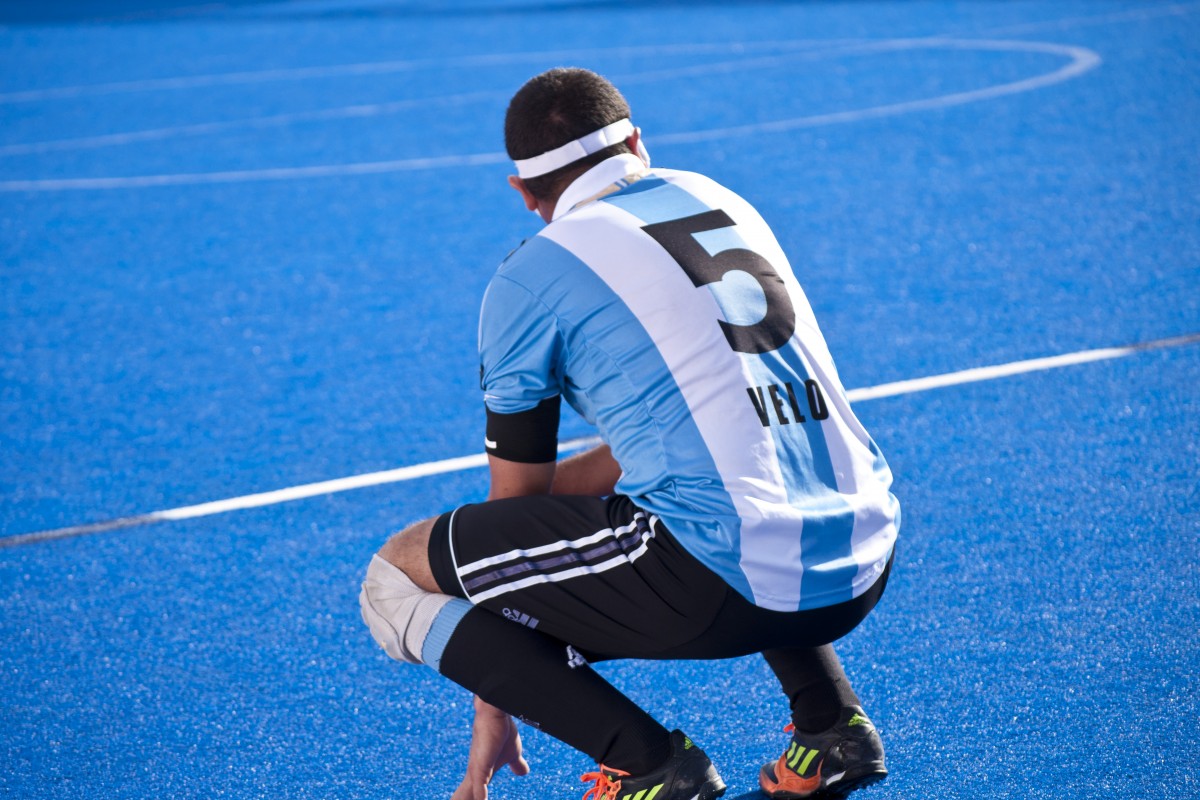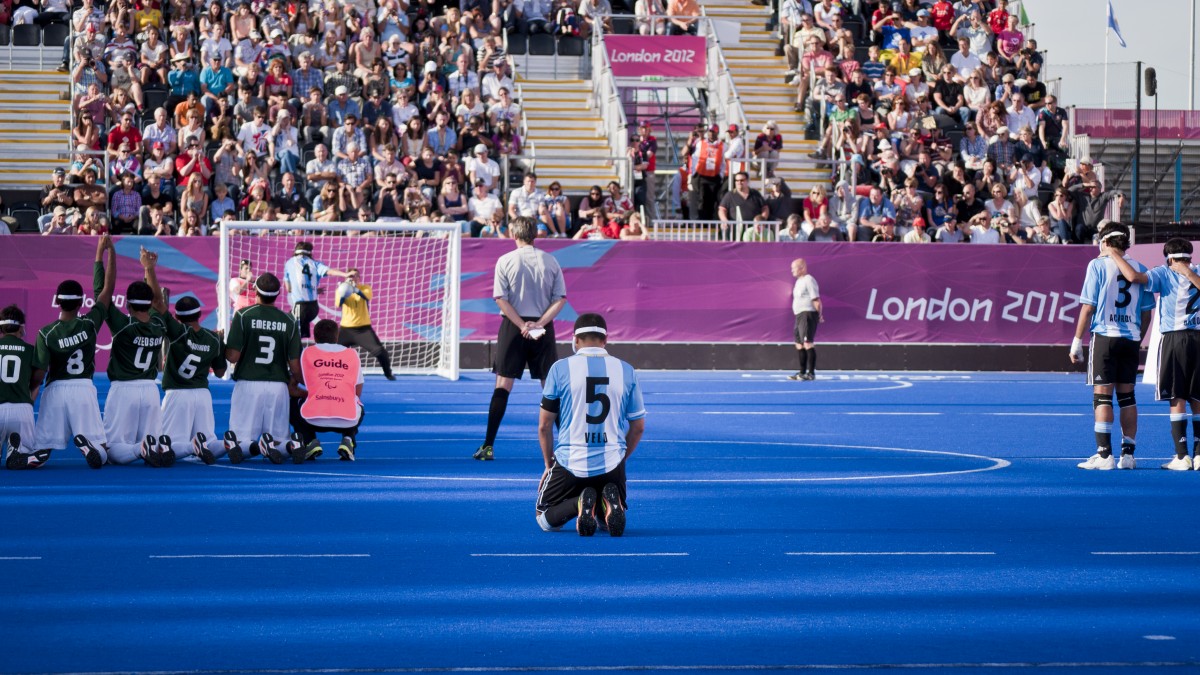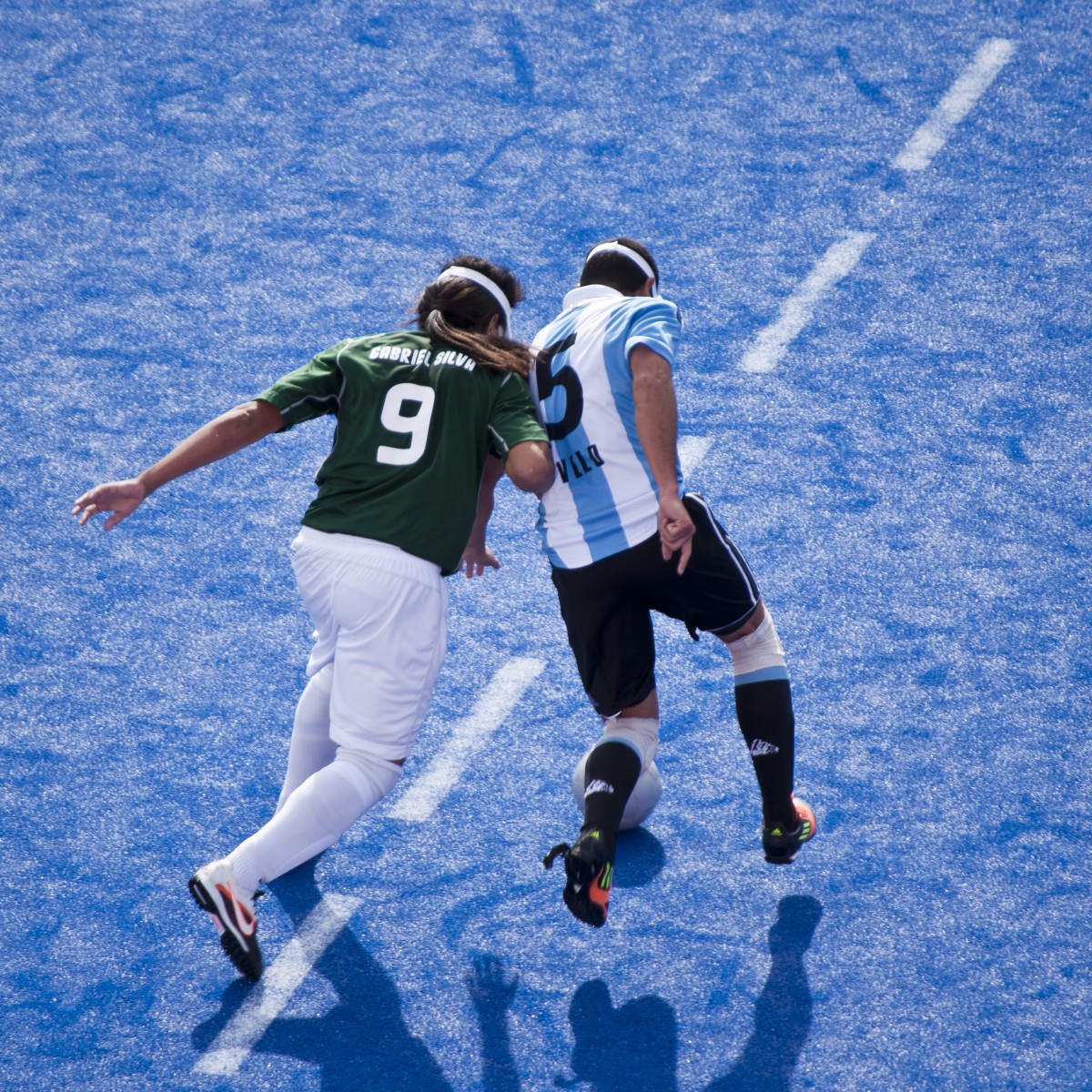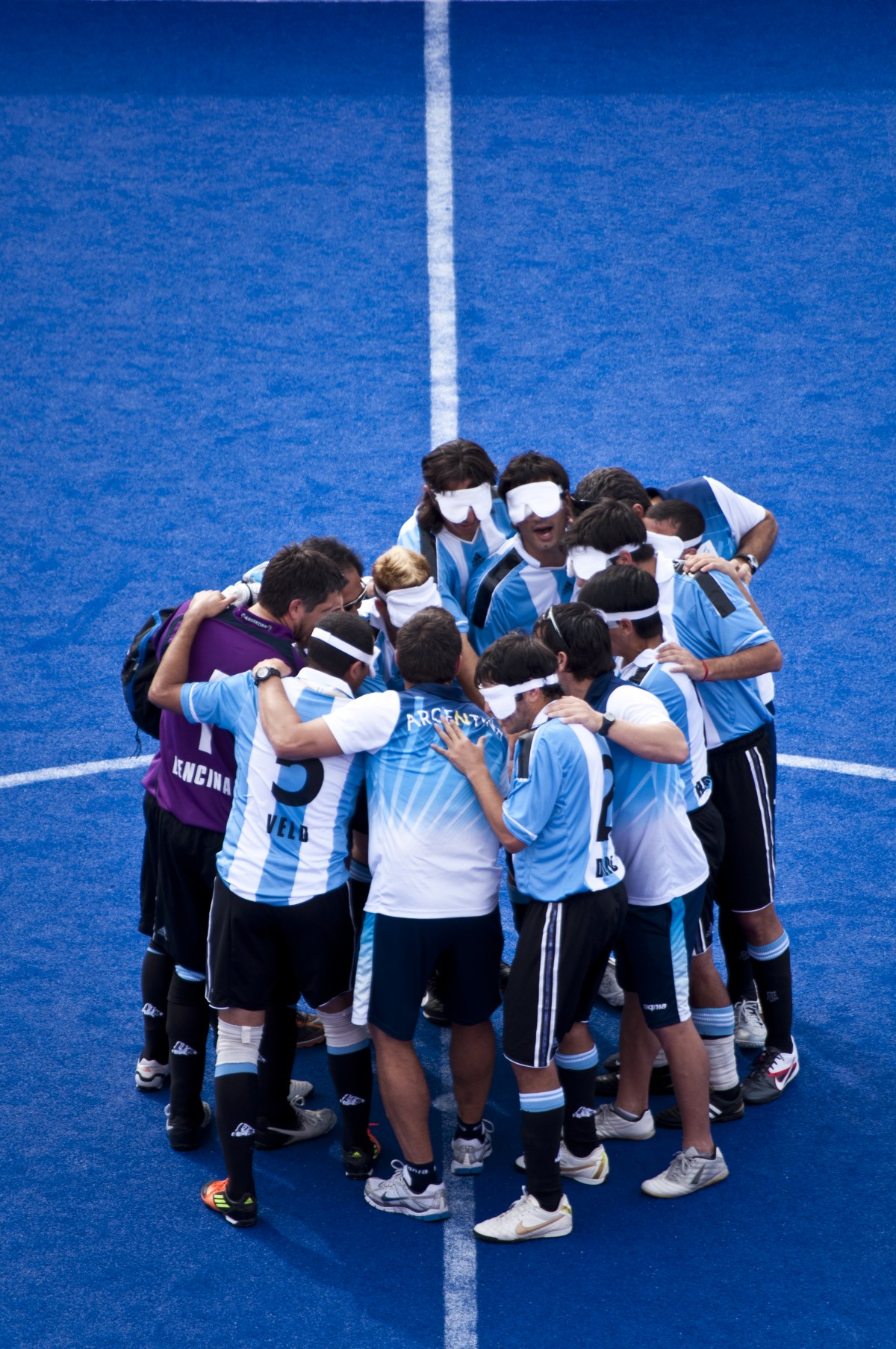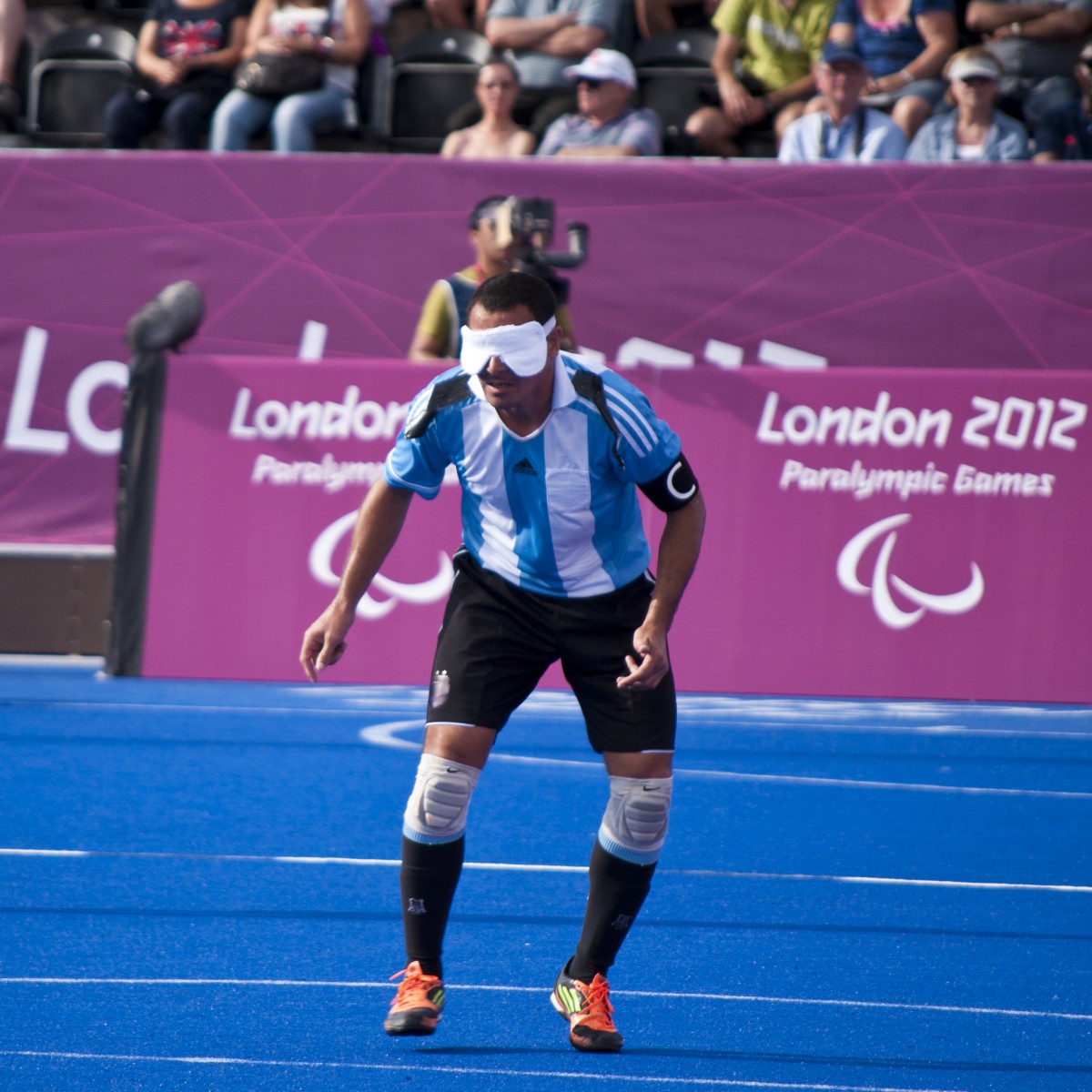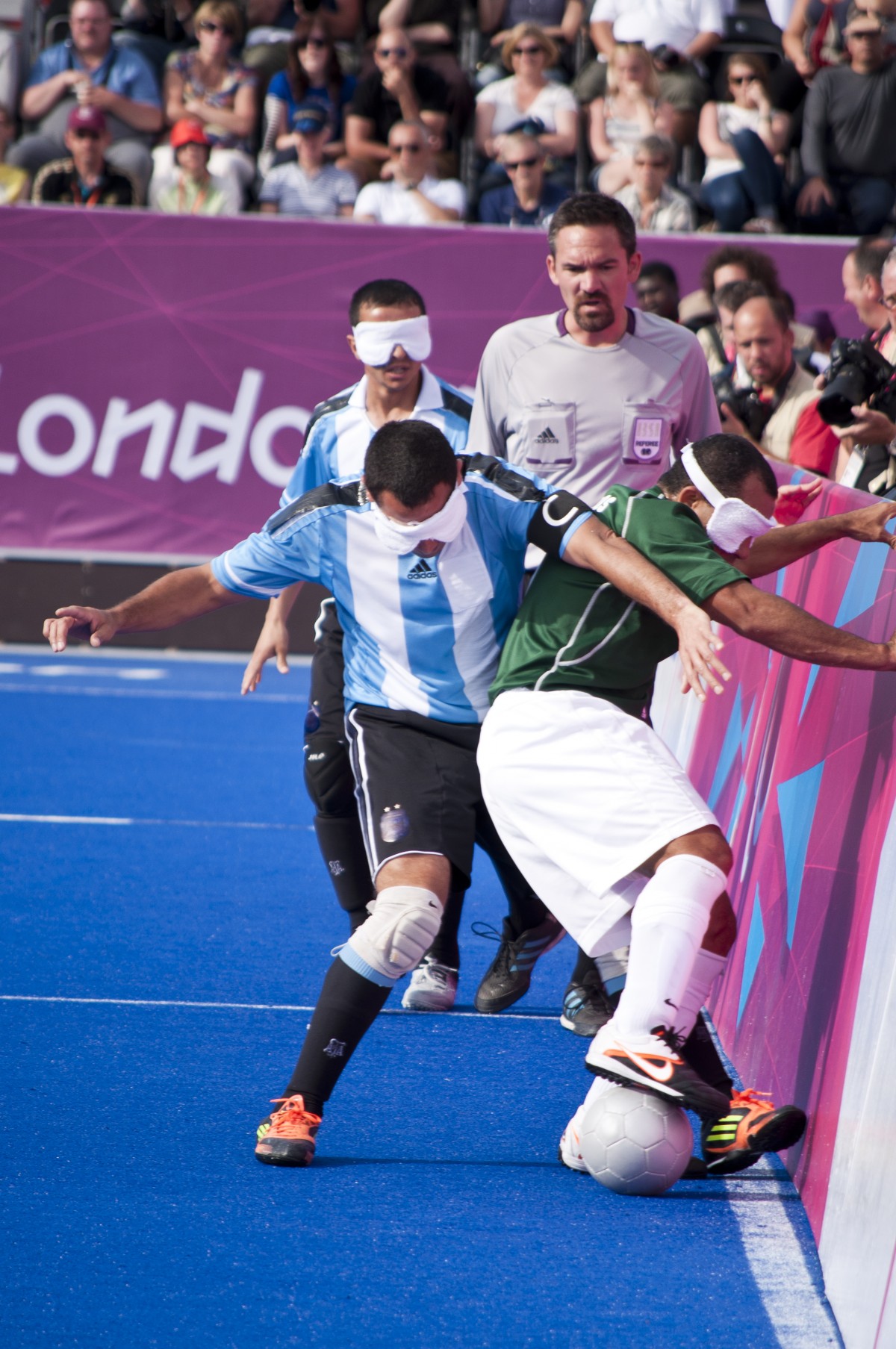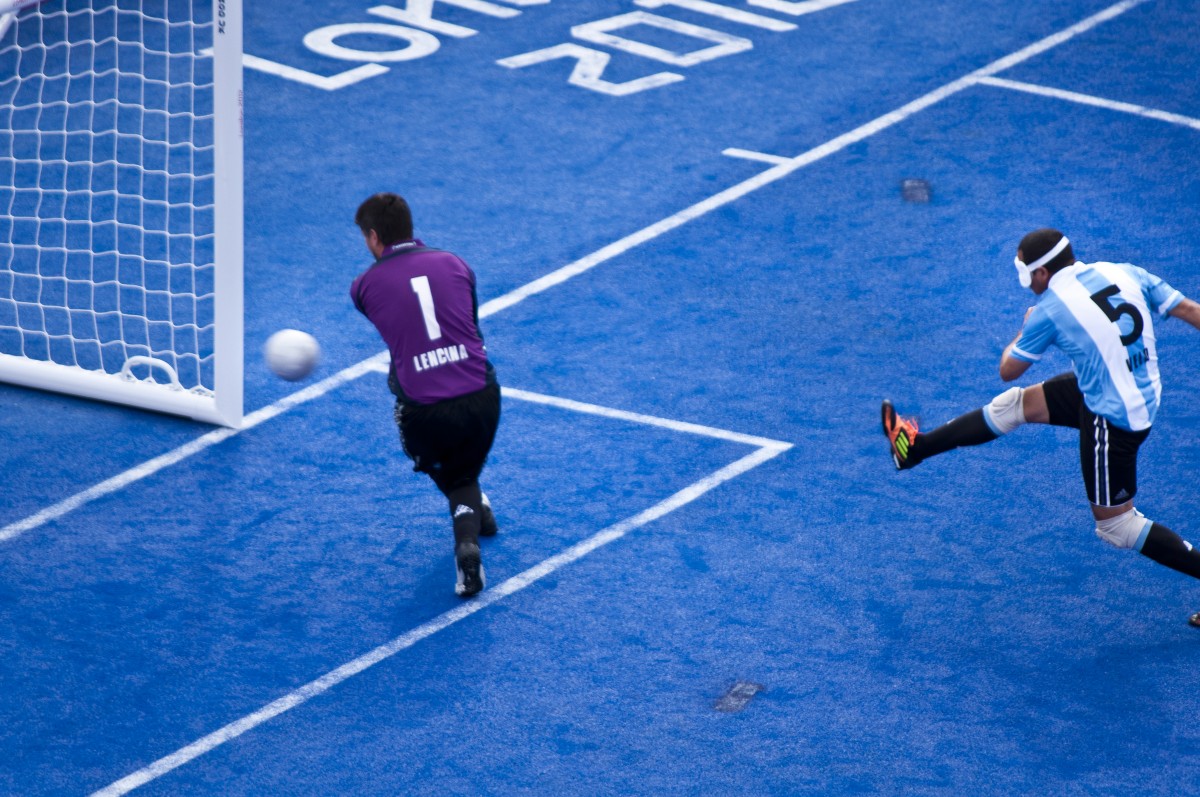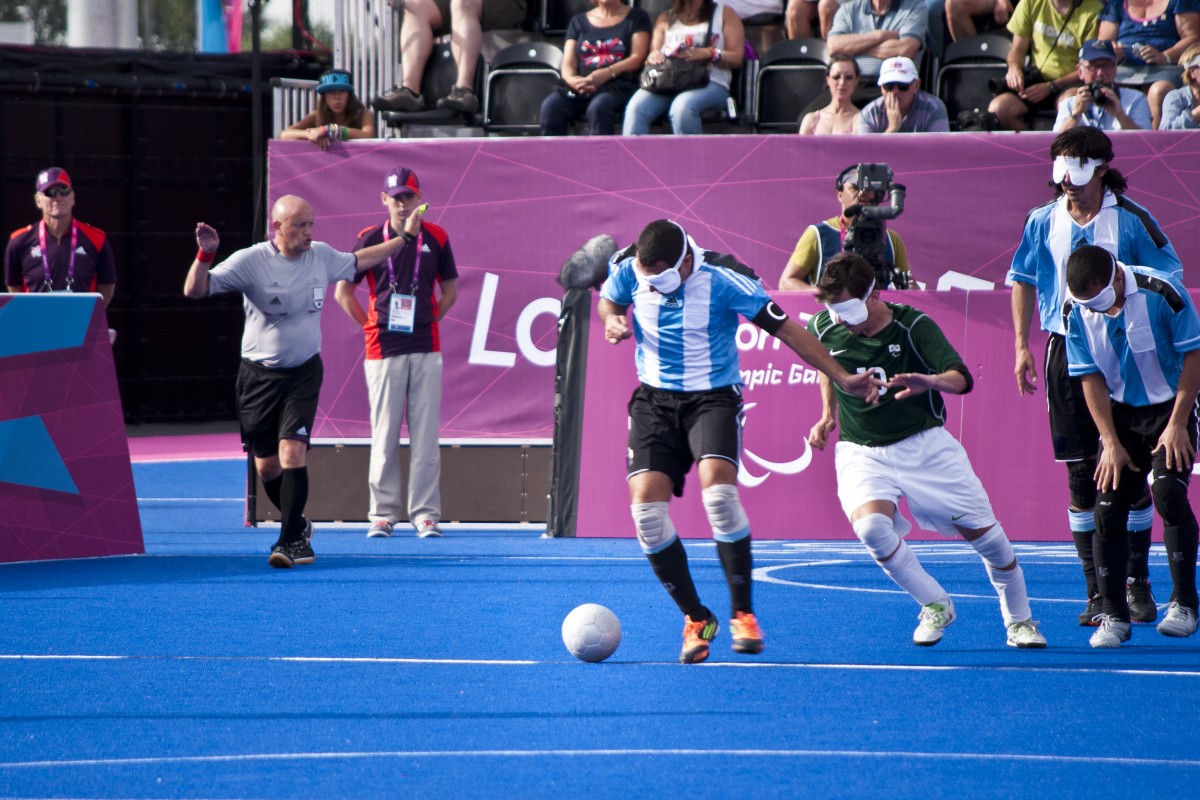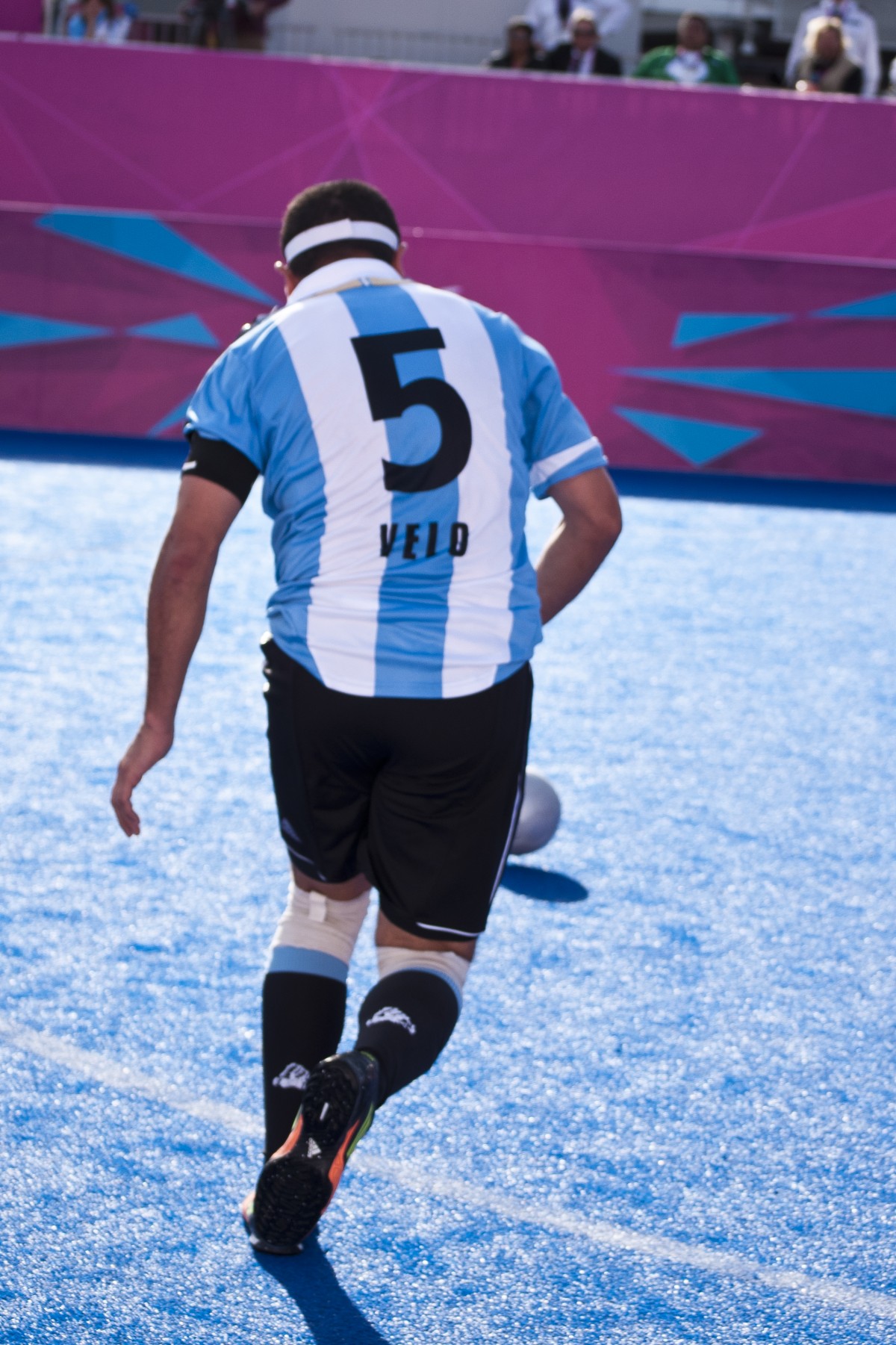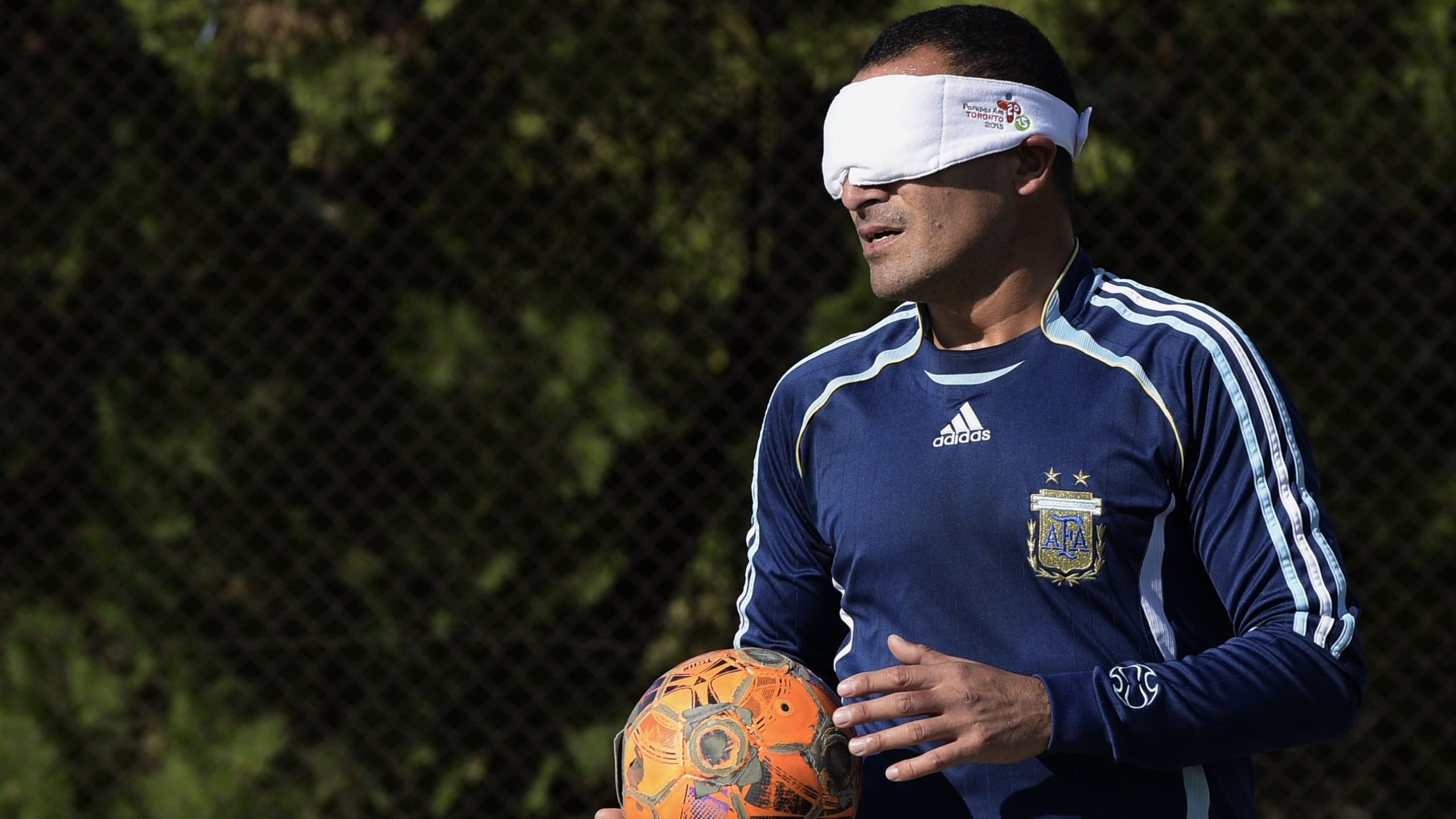The following article first appeared in Issue Ten, released in September 2013.
The Olympic dream that fires the world’s greatest blind footballer
Silvio Velo plays football every day but he has never seen a ball. He is the leader of a team that has never seen him either. Fans idolise him, although nobody chants his name during the games. He appreciates their love and wears his leadership as naturally as someone who has achieved everything. Velo is the unknown star of Argentinian football: he has won two World Cups, two Copas América and countless trophies with his club, River Plate.
His last adventure, however, left a bitter taste. Velo arrived in London one year ago, captain of the Argentinian five-a-side Paralympic blind football team, the Bats. The Argentinian side was one of the favourites to take the gold medal, but destiny matched them with Brazil in semi-finals and the battle of the South Americans ended with Argentina losing on penalties. The bronze-medal match against Spain brought a similar defeat. Velo took a penalty in both shoot-outs; he failed twice.
“At that moment, I felt my body falling apart,” he said. The players went into the changing room and hugged each other for a long time. The captain wasn’t criticised, at least not directly. Breaking the silence, Velo cleared his throat and told everybody that winning or losing was just part of the same road. “Today’s defeat is going to nurture us and increase the mystique around the Bats,” he said. “Let’s think for a moment about the championships we have won. We enjoyed the instant when we lifted the trophy, maybe even the days after it, but when weeks go by, joy fades away and then we focus on our next goal. This defeat is not going to be different.”
The Paralympic gold medal is the only award that Velo hasn’t yet won. He took silver in Athens 2004 and bronze in Beijing. “It’s going to be one more battle, that’s all,” he said. “The gold medal is a dream that is going to come true when I turn 46. I only have to wait three more years.” Climbing to the highest level of the podium in London would have been the culmination of a career that began four decades ago in San Pedro municipality, on the right bank of Paraná river, 180km from Buenos Aires.
The Maradona of the Bats was born on 29 May 1971 to a family of little means, open-eyed but unable to appreciate light. When he was a kid, Silvio wanted to do the same things that his brothers were doing: play football, ride a bike… “I played hide-and-seek with my friends, but I never found anyone,” he joked. “When I was young I didn’t know about blind football. I played with my friends and my brothers on the neighbourhood pitch, without jingling bell balls. I didn’t care if I was good or bad, I just wanted to play. Then, when I stumbled upon an audible ball, when I found out that there were other blind people playing football too… Try to imagine it. I saw the ball when I heard it.”
Velo’s life changed when he heard the ball with bells for the first time. Nowadays, he trains three hours a day, splitting his time between the gym and the 20mx40m pitch where he plays. The 5-a-side blind football pitch is surrounded by kickboards from which the clinking ball rebounds. The sound is so important in this game that spectators are asked to remain quiet while the ball is in play. For this reason, there are no chants, nobody shouts and the fans’ support is something that the players have to assume exists.
However, there is constant yelling from the goals and the sidelines. They are orders, either from the goalkeepers, the only players who are sighted, or from the guides, who call the plays and try to orientate their footballers. There are many collisions and risky situations; it’s a tough game, in which injuries are common and it’s difficult to restrain from shouting or clapping.
The referee often has to ask the team assistants to calm down and the videoscreens in the stands insist that the crowd should be “silent please.” The assumption is that the spectators are not blind, which is one of the paradoxes of the game: those watching will never be able to appreciate fully what it takes to be good at it. All the sighted spectators can do is try to imagine a player’s situation, the fear they must have of running into an opponent and how pointless it would be to yell that one of your teammates should open his eyes. More than anything else, following blind football demands a great deal of empathy; otherwise, a spectator might just joke about how often the success of an attack seems to depend on chance.
But a recent analysis indicates that viewers do tend to understand how the game is played. During the 2010 World Cup, staged in Hereford, researchers at the Hogeschool van Amsterdam found that about two thirds of the spectators found watching a game made them understand blindness and blind football better. More than a third also thought it was “very likely” they would visit a similar event in the future. What’s more, the analysis showed that most spectators had had no prior experience of blind football, contradicting the predominant view that only the players’ friends and relatives would show up. In the future, the lead researcher Donna De Haan summarised in her paper, blind football is likely to “manifest itself locally, with the view to global extension.”
If this is ever to happen, the sport already has a shining star. In Argentina, Silvio Velo is such a celebrity that he will soon have his own TV show, Velo Bien, which can either mean “look at it closely”, or something like “well done, Velo.” “We picked the name because it hints at something beyond the visible, something of the mind,” said his manager Nicolás Halac. The programme will be screened from September 2013 and, unusually for a TV show, Velo says the visible is not all that important: “We want to get the viewers to another level. The show will consist of conversations with personalities who have faced obstacles in their lives and I will discuss how they overcame these.”
Two such interviews have already been produced. The well-known Argentinian hockey coach and former player Sergio ‘Cachito’ Vigil spoke with Velo about his life and career. The other is Marcos de Palma, another of Argentina’s icons, who was the first person known to be born in Antarctica. Velo insists he isn’t nervous about this new era of media exposure. “You know, I actually like cameras because they don’t do anything to me. And if they did, how would I tell?” Indeed, he is looking forward to much more than the first screening of the show. One of the subjects he dreams of interviewing is the basketball legend Michael Jordan. If he could get Jordan to tell viewers what makes him afraid or explain if he ever lacks self-esteem, Velo believes, that would mark the success of Velo Bien.
Another obvious choice for the programme would be Lionel Messi, his big idol, although, Velo is keen we should “not forget about Diego.” Velo has already met Messi. “It was only very brief and we did not have a deep conversation,” Velo said. “But I know he is not only a great footballer but also a great guy. You just feel these things, you know.” Velo believes Messi is “the best player in the world” and imagines Barcelona’s number ten to be agile, technically skilful and fast. “And with excellent scoring abilities,” he adds, which sounds like what anybody else would say but Velo insists he has a very specific image of his idol. “It must be beautiful to see him play,” he said. “I guess he really caresses the ball, rather than just kicking it.”
This is the ideal Silvio Velo himself has always been striving to achieve. And it is one that is becoming more and more prevalent in blind football generally. Last year’s Paralympics saw an improved level of technical skills and, surprisingly, a lot of dribbling. David Beckham was impressed by the quality and so, to their surprise, was the Argentinian side. “We knew that the other teams were strong,” said Velo’s teammate Federico Acardi after losing the bronze-medal match. “But we were still hoping to be better than them.”
Could Silvio Velo be Messi’s idol? “I wish,” Velo admits. What is certain is that Velo devotes himself to explaining what football has given him through inspirational speeches, given in schools, offices and jails. “It is always good to find people who can take advantage of your experience,” said Velo. “I was born blind and I talk particularly about diversity, about not falling behind, taking advantage of one’s abilities and not complaining about what you lack. It would have been impossible for me to complain about my sight, since I never had it. I had to enhance my other skills in order to pull through.”
Perhaps it is a positive sign for the sport that Velo, the most decorated athlete of the discipline, still has not managed to win Paralympic gold. Blind football has been growing at an impressive pace in recent decades. Starting off as a playground game for children in schools for the visually impaired, blind football has long been played in a number of countries, but always according to local rules that varied from one place to another. Brazil and Spain were the first countries to set up championships in the 1980s, but the sport only joined the International Blind Sports Federation (IBSA) in 1996. With a unified framework of rules, blind football made its Paralympic debut at Athens 2004. Today, athletes in more than 35 countries play it and, at London 2012, blind football was one of the biggest disciplines by participating athletes.
Especially in rapidly evolving sports such as this, there are always athletes whose successes do not reflect their significance but Velo, who has twice been the Paralympic flagbearer for Argentina, hopes not to be among them. “I am already now preparing for 2016,” he said. “Physically and technically, I am working on it now and I also follow a specific diet to get ready.” The Games of Rio will be his last chance to win gold, in an environment in which the younger players could in theory be his children. “That’s why I have to work even harder,” he said, adding that he wants “to continue to be the best player in the world for as long as possible.”
If you enjoy this, then for more unique and original football storytelling every quarter from just £20 a year, subscribe to The Blizzard.
Velo believes in his qualities and is not shy of talking about them. He admits that football has always been the most important thing in his life and is sure there is nothing else he could have done. “If I hadn’t become a footballer,” he said, “I would have been a goalkeeper.” But he knows he could never be one, as in blind football the keepers are the only players who are sighted. “In that case, I would just have been a footballer anyway. I was born blind, but I always had the desire to play with the ball. Football is not something you see, you feel it.”
So given his yearning for the medal, would he ever follow the example of the original Diego and use the hand of God? “The hand is never part of our game, unfortunately,” Velo said with a smile. “When the ball is up in the air, we can’t hear the bell in it ringing. We really prefer to keep it on the ground. But would it be tempting… yes, it would be. Very much.”
. The players went into the changing room and hugged each other for a long time. The captain wasn’t criticised, at least not directly. Breaking the silence, Velo cleared his throat and told everybody that winning or losing was just part of the same road. “Today’s defeat is going to nurture us and increase the mystique around the Bats,” he said. “Let’s think for a moment about the championships we have won. We enjoyed the instant when we lifted the trophy, maybe even the days after it, but when weeks go by, joy fades away and then we focus on our next goal. This defeat is not going to be different.”
The Paralympic gold medal is the only award that Velo hasn’t yet won. He took silver in Athens 2004 and bronze in Beijing. “It’s going to be one more battle, that’s all,” he said. “The gold medal is a dream that is going to come true when I turn 46. I only have to wait three more years.” Climbing to the highest level of the podium in London would have been the culmination of a career that began four decades ago in San Pedro municipality, on the right bank of Paraná river, 180km from Buenos Aires.
The Maradona of the Bats was born on 29 May 1971 to a family of little means, open-eyed but unable to appreciate light. When he was a kid, Silvio wanted to do the same things that his brothers were doing: play football, ride a bike… “I played hide-and-seek with my friends, but I never found anyone,” he joked. “When I was young I didn’t know about blind football. I played with my friends and my brothers on the neighbourhood pitch, without jingling bell balls. I didn’t care if I was good or bad, I just wanted to play. Then, when I stumbled upon an audible ball, when I found out that there were other blind people playing football too… Try to imagine it. I saw the ball when I heard it.”
Velo’s life changed when he heard the ball with bells for the first time. Nowadays, he trains three hours a day, splitting his time between the gym and the 20mx40m pitch where he plays. The 5-a-side blind football pitch is surrounded by kickboards from which the clinking ball rebounds. The sound is so important in this game that spectators are asked to remain quiet while the ball is in play. For this reason, there are no chants, nobody shouts and the fans’ support is something that the players have to assume exists.
However, there is constant yelling from the goals and the sidelines. They are orders, either from the goalkeepers, the only players who are sighted, or from the guides, who call the plays and try to orientate their footballers. There are many collisions and risky situations; it’s a tough game, in which injuries are common and it’s difficult to restrain from shouting or clapping.
The referee often has to ask the team assistants to calm down and the videoscreens in the stands insist that the crowd should be “silent please.” The assumption is that the spectators are not blind, which is one of the paradoxes of the game: those watching will never be able to appreciate fully what it takes to be good at it. All the sighted spectators can do is try to imagine a player’s situation, the fear they must have of running into an opponent and how pointless it would be to yell that one of your teammates should open his eyes. More than anything else, following blind football demands a great deal of empathy; otherwise, a spectator might just joke about how often the success of an attack seems to depend on chance.
But a recent analysis indicates that viewers do tend to understand how the game is played. During the 2010 World Cup, staged in Hereford, researchers at the Hogeschool van Amsterdam found that about two thirds of the spectators found watching a game made them understand blindness and blind football better. More than a third also thought it was “very likely” they would visit a similar event in the future. What’s more, the analysis showed that most spectators had had no prior experience of blind football, contradicting the predominant view that only the players’ friends and relatives would show up. In the future, the lead researcher Donna De Haan summarised in her paper, blind football is likely to “manifest itself locally, with the view to global extension.”
If this is ever to happen, the sport already has a shining star. In Argentina, Silvio Velo is such a celebrity that he will soon have his own TV show, Velo Bien, which can either mean “look at it closely”, or something like “well done, Velo.” “We picked the name because it hints at something beyond the visible, something of the mind,” said his manager Nicolás Halac. The programme will be screened from September 2013 and, unusually for a TV show, Velo says the visible is not all that important: “We want to get the viewers to another level. The show will consist of conversations with personalities who have faced obstacles in their lives and I will discuss how they overcame these.”
Two such interviews have already been produced. The well-known Argentinian hockey coach and former player Sergio ‘Cachito’ Vigil spoke with Velo about his life and career. The other is Marcos de Palma, another of Argentina’s icons, who was the first person known to be born in Antarctica. Velo insists he isn’t nervous about this new era of media exposure. “You know, I actually like cameras because they don’t do anything to me. And if they did, how would I tell?” Indeed, he is looking forward to much more than the first screening of the show. One of the subjects he dreams of interviewing is the basketball legend Michael Jordan. If he could get Jordan to tell viewers what makes him afraid or explain if he ever lacks self-esteem, Velo believes, that would mark the success of Velo Bien.
Another obvious choice for the programme would be Lionel Messi, his big idol, although, Velo is keen we should “not forget about Diego.” Velo has already met Messi. “It was only very brief and we did not have a deep conversation,” Velo said. “But I know he is not only a great footballer but also a great guy. You just feel these things, you know.” Velo believes Messi is “the best player in the world” and imagines Barcelona’s number ten to be agile, technically skilful and fast. “And with excellent scoring abilities,” he adds, which sounds like what anybody else would say but Velo insists he has a very specific image of his idol. “It must be beautiful to see him play,” he said. “I guess he really caresses the ball, rather than just kicking it.”
This is the ideal Silvio Velo himself has always been striving to achieve. And it is one that is becoming more and more prevalent in blind football generally. Last year’s Paralympics saw an improved level of technical skills and, surprisingly, a lot of dribbling. David Beckham was impressed by the quality and so, to their surprise, was the Argentinian side. “We knew that the other teams were strong,” said Velo’s teammate Federico Acardi after losing the bronze-medal match. “But we were still hoping to be better than them.”
Could Silvio Velo be Messi’s idol? “I wish,” Velo admits. What is certain is that Velo devotes himself to explaining what football has given him through inspirational speeches, given in schools, offices and jails. “It is always good to find people who can take advantage of your experience,” said Velo. “I was born blind and I talk particularly about diversity, about not falling behind, taking advantage of one’s abilities and not complaining about what you lack. It would have been impossible for me to complain about my sight, since I never had it. I had to enhance my other skills in order to pull through.”
Perhaps it is a positive sign for the sport that Velo, the most decorated athlete of the discipline, still has not managed to win Paralympic gold. Blind football has been growing at an impressive pace in recent decades. Starting off as a playground game for children in schools for the visually impaired, blind football has long been played in a number of countries, but always according to local rules that varied from one place to another. Brazil and Spain were the first countries to set up championships in the 1980s, but the sport only joined the International Blind Sports Federation (IBSA) in 1996. With a unified framework of rules, blind football made its Paralympic debut at Athens 2004. Today, athletes in more than 35 countries play it and, at London 2012, blind football was one of the biggest disciplines by participating athletes.
Especially in rapidly evolving sports such as this, there are always athletes whose successes do not reflect their significance but Velo, who has twice been the Paralympic flagbearer for Argentina, hopes not to be among them. “I am already now preparing for 2016,” he said. “Physically and technically, I am working on it now and I also follow a specific diet to get ready.” The Games of Rio will be his last chance to win gold, in an environment in which the younger players could in theory be his children. “That’s why I have to work even harder,” he said, adding that he wants “to continue to be the best player in the world for as long as possible.”
Velo believes in his qualities and is not shy of talking about them. He admits that football has always been the most important thing in his life and is sure there is nothing else he could have done. “If I hadn’t become a footballer,” he said, “I would have been a goalkeeper.” But he knows he could never be one, as in blind football the keepers are the only players who are sighted. “In that case, I would just have been a footballer anyway. I was born blind, but I always had the desire to play with the ball. Football is not something you see, you feel it.”
So given his yearning for the medal, would he ever follow the example of the original Diego and use the hand of God? “The hand is never part of our game, unfortunately,” Velo said with a smile. “When the ball is up in the air, we can’t hear the bell in it ringing. We really prefer to keep it on the ground. But would it be tempting… yes, it would be. Very much.”
If you enjoy this, then for more unique and original football storytelling every quarter from just £20 a year, subscribe to The Blizzard.
